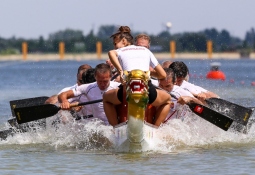When Nicholas Robinson was 13 his parents signed him up for sea scouts, thinking it would be a good outlet for an energetic teenager.
Nothing too unusual about that, except Nicholas Robinson was a teenager in Trinidad and Tobago, where you could count the number of serious canoe sprint athletes on less than half a hand.
So not surprisingly, Robinson didn’t last in the sport for too long. There were too many other temptations.
“We had normal recreational kayaking, and they tried to introduce it to me back then,” Robinson said.
“But I told myself I would rather go off with my friends and hang out and have fun.”
While Nicholas Robinson didn’t last long, his older brother had much more staying power. Eight years after walking away from the canoe, Nicholas decided to give it another go.
“My brother was involved and he had stayed in it, and my parents were nagging me to go with him and have fun and train with him,” he said.
“I eventually went back out. I started to think, if I am here, training with him, I may as well start taking it seriously. From there my love for canoeing started to grow, and the rest is history.
“Now I’m here, and I currently hold the 200 and the 1000 record back home. I think my brother is happy for me.”
This week 25-year-old Robinson is part of an ICF development camp ahead of the 2021 paracanoe and canoe sprint world championships in Copenhagen. He’s joining athletes from countries like Iran, Greece, Moldova and Cyprus to learn from elite coaches how to take their paddling to the next level.
From Thursday he’ll be able to put what he has learned into practice when he lines up in world championship events, kicking off with the K1 200.
“This development camp has helped me a lot, both in terms of technique and conditioning, we got a lot of tips to help me towards my future growth and development,” Robinson said.
Coming to a development camp is only a small step on the way to becoming an elite athlete for Robinson. In Trinidad and Tobago there are few resources, boats are old and the athletes have to train on the ocean.
“We have a couple of athletes back home, and we are all trying to push the barriers to make new standards and new records in Trinidad and Tobago in an unchartered sport,” Robinson said.
“In our country it has been around for about ten years, but the growth and development has been a bit slow, so right now a lot of us have been training to try and come out and do our best to raise that bar and that standard.
“We know it is a flatwater sport, but we don’t have any flatwater, so we train on the ocean.”
Robinson was already dreaming of getting to the highest level, even before he set foot in Copenhagen this week. Now he’s even more enthusiastic, and he’s hoping to bring a few teammates with him.
“My end goal is to get to the Olympics in Paris 2024. After this I will have about two and a half years, and I’m hoping with this experience and this exposure it will help me,” he said.
“At the moment we have no female paddlers back home, so our hope is that through this exposure we can build some awareness. I really want our sport to develop and grow.”
The 2021 ICF canoe sprint and paracanoe world championships begin in Copenhagen on Thursday.


